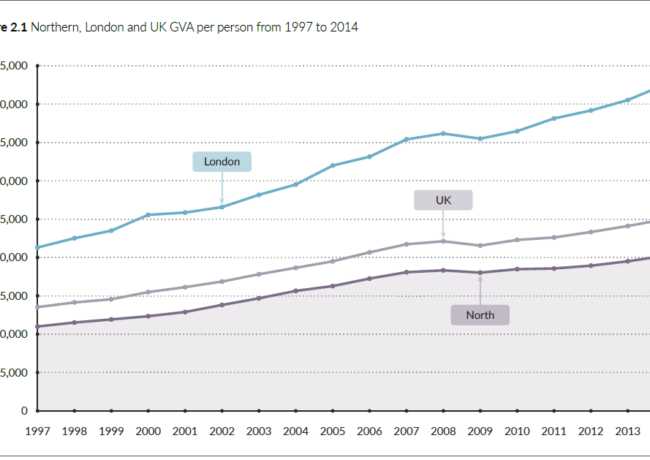First look at Northern Powerhouse business plan
The North’s best chance lies in better interaction of financial and professional services, logistics and further and higher education, according to early findings of the Northern Powerhouse Independent Economic Review, due to be published in full next month.
The NPIER was commissioned by Transport for the North, the group of local authorities and public bodies which aims to become a statutory body in early 2017. The findings of the NIER take up 10 of the 33 pages of the TfN report published yesterday. The full findings are due to be revealed in April.
The economic review, part study and part manifesto, has echoes of the Manchester Independent Economic Review published in April 2009, which has since been used repeatedly as the foundation for Greater Manchester’s growth plan and policymaking, underpinning bids to Government for devolved power, additional funding and greater control over local spending. The MIER is seen by many as the tool that makes Manchester’s case hard to refuse. Lord O’Neill, formerly an economic adviser to the Greater Manchester authorities, now advises Chancellor George Osborne.
The Northern Powerhouse review “evidences need for strategic investment in transport to create a radical repositioning of the northern economy…and ensures that proposals for short, medium and long-term investment are supported by a robust economic case.”
Northern highlights
- Population more than 15m
- 7.4m jobs
- £300bn Gross Value Added economic output per year
- “…strong quality of place supported by national parks, culture and history”
- 19% of UK exports, “but potential to perform markedly better”
The authors talk of a “more integrated economy”, with a “focus on planning and decision-making to enhance the economic potential of the North” although inevitably transport is seen as the main solution. There are mentions of greater supply of housing, using new technologies and improved access to specialist skills.
Three different scenarios for the future of the North are described: business as usual, transformational and the most ambitious, transformational plus, which would deliver an additional £56.6bn GVA per year in 2015 prices to the UK economy by 2040.
The report states: “The Review’s analysis has identified four Northern Powerhouse prime capabilities and three enabling capabilities. The four prime capabilities are:
- advanced manufacturing with a particular focus on materials and processes;
- energy, in particular expertise around generation, storage and low carbon technologies and processes, and especially in nuclear and offshore wind;
- health innovation with a focus on life sciences, medical technologies and devices, and a growing competence in new service delivery models brought about by e-health and devolution within the health service; and
- digital technology focusing in particular on computation, software tools/design and content, data analytics, simulation/modelling, and wider strengths in media.
“The three key enabling capabilities are financial and professional services, logistics and further and higher education. It is the combination of key prime and enabling capabilities, the way they interact, and the quality of life provided for the North’s businesses and residents, that provide the North’s economic distinctiveness and potential for transformational levels of growth.”
These sectors account for about 30% of jobs and more than one third of the North’s economy in GVA terms. Transport should, the report argues, be used to also support growth in leisure and tourism, business support services, consumer services and public services.
By linking large towns and cities better together supply chains will operate more smoothly and employers will have access to specialist skills and greater exchanges of knowledge, the report said.
Responding to the Transport for the North publications, Dave Trimingham, executive director of economic and planning consultancy Turley in Manchester, said: “Northern Powerhouse investment decisions must be based on a robust, independent economic evidence base. This is an essential part of strategic planning for growth. It is good to see the economic case for rebalancing UK growth being made.
“It is important that the findings of the NPIER reflect the aspirations of the organisations that are driving growth across the North and that they are translated into plans to meet the economic and housing needs of the Powerhouse. The NPIER is likely to be an important component of the strategic development plans that are emerging from devolution processes and engagement with business is key. As the study recognises, growth sectors such as logistics are almost entirely driven by the private sector. Plans for the sector therefore need to reflect the investments that are ongoing and the business plans of key players.
“It is good to see the recognition in the interim report on the M60 NW Quadrant Study that transport capacity is constraining growth around key parts of Greater Manchester and that further work to find ways of facilitating growth are under consideration. I hope this signals further action by Government to redress the imbalance in investment in transport that currently sees London and the South receiving much more investment per head than the North.”




